#clancy redemption arc lets go
Text
the circulating theory that clancy might be/become a bishop is so intriguing to me because that's literally the 'you've become the very thing you swore to destroy' / 'you either die a hero or live long enough to see yourself become the villain' trope and i'm a sucker for dark fictional content about heroes who lose themselves along the way to justice - idk if that's a path tyler would choose for his story to go down, though
#i sometimes need to remind myself that the bands lore is not just some random story#but ultimately an allegory of living with/through mental illness#BUT i can still indulge in thousands of other ways to interpret it and treat it just the same as any other fictional content#i love the trench saga sm it gives me loads of breadcrumbs to consume for my content-starved brain#twenty one pilots#clancy#also im not saying this theory cannot be canon whatsoever#it COULD be#but that's just not how the story would END#this being in the middle of the plot point would be so interesting#clancy redemption arc lets go
15 notes
·
View notes
Text
My Hopes for Picard Season 2
Have some rambly writing while I practice social distancing! Under the cut are my ideas of things I would like to see in the second season of Star Trek: Picard.
More of Laris and Zhaban.

These were two excellent characters that felt somewhat underused -- Zhaban in particular, as Laris got most of the important scenes and dialogue. Their backstory is only really given in the comics, and I’d love to see it explored properly in an actual episode. Either let them join the crew, or give an episode actually devoted to them. Perhaps some former Tal Shiar connections hunt them down, and the La Sirena crew must protect them? I don’t know, but there’s a lot of potential there.
Consequences for Picard’s android body.

Putting Picard’s consciousness into the android body was rather predictable, and seemed a deus ex machina ending for him to simply escape his terminal condition scot-free. He’s essentially the same as he was, and nothing has changed. I would love to see season 2 actually give us drawbacks for this decision. Maybe his android body has some quirks he wasn’t expect. Maybe he breaks down, or someone can hack his programming. Just allow for this major decision to be a defining point of his character going forward, not a snap fix where everything is magically the same.
More xBs.

The xBs were built up as such a good plot point, a group of people to support and rally behind, but then hardly got to do anything. I’d love to see more xBs in season 2, get to know more of them personally, experience their struggles re-integrating into society, and watch characters like Picard and Seven step in to directly help them adjust.
Justice for Hugh.

Hugh’s death was by far the most hated plot point of the season (at least with everyone I’ve spoken to). To bring back this character, make him into someone so warm and wise and instantly lovable, only to kill him off in such a shocking yet underwhelming way -- it’s deeply unfair and honestly harmed the story more than it helped. I’m not saying they should just snap their fingers and bring him back -- they did it with Culber in Discovery season 2, and imho it didn’t work at all -- but if there is a way to organically bring him back and weave him into the story once more, I welcome it. If that’s not possible, then let his presence and death hold greater weight so that he can be given greater meaning at least retroactively.
Consequences for Agnes.

Agnes’s murder of Bruce Maddox was rather brushed aside in the finale, and I don’t think that’s something to be forgotten so easily. I feel the characters should be much less reluctant to trust her, and she should be reluctant to trust herself. I hope to see her explored further in season 2, rather than simply brushing the whole thing aside.
Less Data.

Don’t get me wrong -- I love Data. He’s one of my all time favorite Star Trek characters. But he took over this season, and not always in a good way. The focus was often on him and his legacy, at the expense of other characters both past and present. He was shoehorned into the finale in the strangest way, and personally, his second death scene had absolutely no weight because of that. Brent Spiner says he’s done with the part, and I hope it sticks this time, because as much as I will miss him, Data’s time is done. Let him rest. (I also never want to hear Blue Skies ever again. We’ve done it to death now. Literally.)
More returning characters (and storylines).
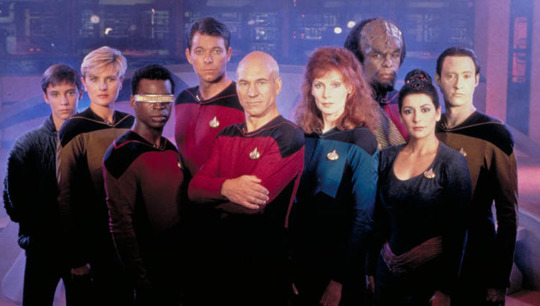
While I don’t want past characters taking up all the screentime, I would like to see more coming back. Season 1 felt odd at times when Picard really should have called on old friends like Geordi, Worf, or Beverly for help, and instead he called on new characters the audience had never seen before. There’s a wealth of past characters to bring here -- the most obvious choices being the rest of TNG’s cast. But there’s also Voyager’s cast, which would work well with Seven of Nine. And we can’t forget Deep Space Nine’s cast! There’s much potential to bring back old characters in new ways, and while the thought does make me nervous, for the most part I respect the decisions made for returning characters and generally trust them with the rest.
More development for Narek.
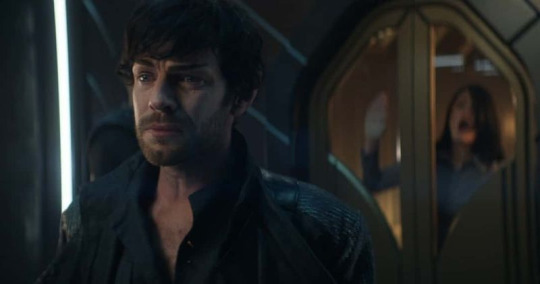
Boy band Romulan here was tragically underdeveloped, only really becoming interesting in the finale when he began playing more of a wild card role. It’s clear there’s much more potential with his character than what they’ve seen, and I’d love to see him continue that unpredictable role with unsure allegiances. Perhaps even a redemption arc? I’m not sure exactly what I want from him, really. Just more than what we’ve been given so far.
More development for Soji.

I don’t think Soji is a bad character. I just think she was sadly underwritten. I can tell you all about what she is, but not who she is. What are her interests? Her motivations? What drives her as a person? I frankly have no idea. The writers have made the mistake of thinking that giving her a mystery is the same as giving her a personality. That needs to be fixed. While it’s easy to pin some of the blame on Isa Briones, I don’t think she’s really a bad actress. She just has so little to work with.
More Elnor.
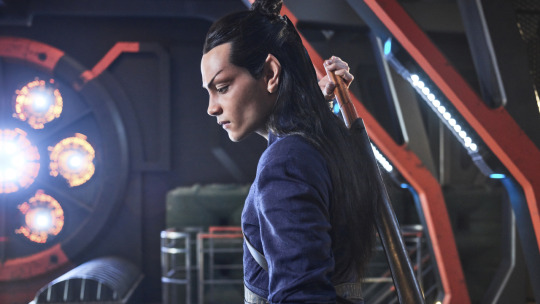
No character in the series is as tragically sidelined as Elnor. After his introduction episode, he essentially tags along for the rest of the plot, watching as the other characters do everything. You could write him out of the series entirely with very little effort. And it makes me sad because he’s a great character! I want to see him take part in driving the plot next season, and focus further on him as a character.
More Seven of Nine.
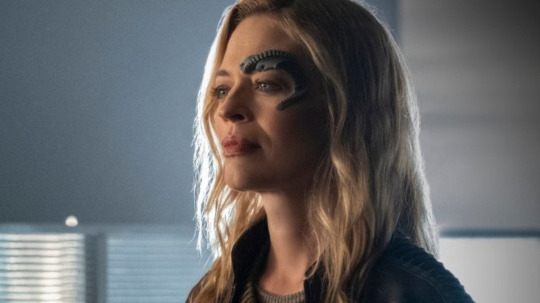
Seven was absolutely fantastic in season 1. It was implied that she’s joining La Sirena’s crew, and I’d love her to be a main character next season. There’s clearly much more to her story to explore, including her guilt at now being a killer. And as I said above, I’d like to see Voyager characters return. Imagine seeing Seven opposite Janeway! Or Tuvok! Or the Doctor! It’d be so good.
More holograms, and hologram rights issues.
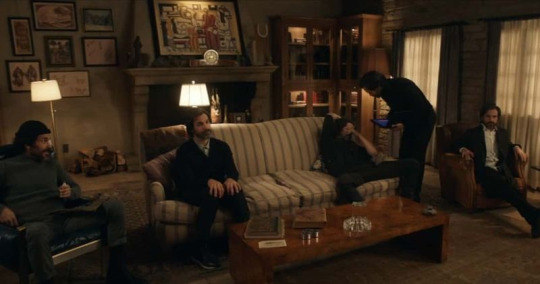
Rios’s holo-squad grew on me a lot as the series progressed, and I’d like to see even more holograms aside from them. This season focused so heavily on android rights, while largely ignoring the same issues in holograms despite the obvious parallels. Voyager started a trajectory of discussing whether holograms were sentient, primarily with the Doctor, and this series is poised to continue that same issue. You could even bring back those very characters, and let the Doctor, Zimmerman, and Barclay chime in on the issue. It’s a plot point ripe for the picking.
Less serialization.
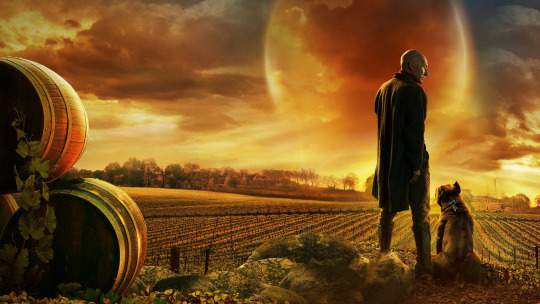
Full serialization is not a bad thing. There are many shows that pull it off near flawlessly. But I don’t think it’s necessarily the right choice for Star Trek. Letting episodes stand on their own to focus on more individualized plots allows for a greater wealth of storytelling and puts the focus primarily on the characters. This season felt a bit unbalanced at times as it tried to tie all the characters and sideplots together into one, but a more episodic approach would largely negate these issues. There should absolutely be a flow between episodes, and perhaps even a build to a grander finale, but overall I think a slightly more segmented style of storytelling would ultimately be the better one.
More Federation nuance.

One of my biggest gripes with season 1 was its portrayal of the Federation. While I do like taking a harder look at the Federation’s mistakes, especially from such a beloved StarFleet officer like Picard, the show did take a pretty sharp turn from showing the Federation as a perfect utopia to showing them as selfish cowards who put fear before compassion. But it’s a complex organization with complex issues. Picard’s conversation with Clancy implied that there were valid political reasons to withdraw from Romulus, even if it wasn’t necessarily the humanitarian thing to do. I would love to see it explored further, without falling so heavily on one side or the other. The Federation is ultimately trying to be a force for good, but it’s certainly a flawed organization that can cause harm if it isn’t careful. Different characters may have very different views of it, and different levels of what nonsense they are willing to tolerate from it. It’s certainly a hard line to balance in storytelling, but it can be done -- Deep Space Nine did it damn near flawlessly. Be more like Deep Space Nine, Picard.
And that’s all I’ve got for now!
If you actually made it all the way down here, thanks for reading <3
#personal#star trek: picard#picard spoilers#star trek#picard#i still need to think further before i can assemble my full thoughts on season 1 tbh#but i can look ahead to season 2 at least
15 notes
·
View notes
Text
2018: My year in games
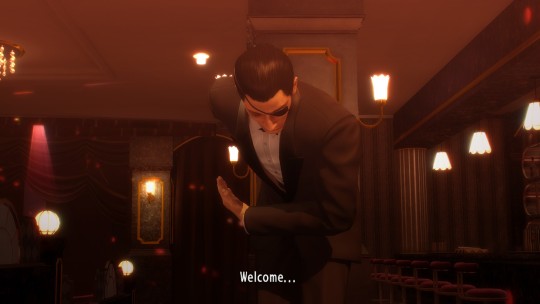
2018 was another good year for gaming as far as I’m concerned, provided you haven’t played Fallout 76 that is. Sony’s still releasing great exclusives, to the point I’m left wondering whether they can keep it up, and we’ve had some interesting releases on PC as well. I don’t have a clue as to how Microsoft is doing, but their one exclusive title I might’ve been interested in, Sea of Thieves, had a messy release and is only available on the Windows 10 store (no, thanks). Notably absent in the release schedule this year was EA’s BioWare, who have been working to release Anthem come February 2019, a title I have little hopes for considering how much it departs from the games the developer is known for as EA tries to embrace the Destiny “live services” crowd everyone is so keen on getting these days (*cough*Bethesda*cough*). CD Projekt RED is also on standby as they continue to work towards Cyberpunk 2077′s release... sometime. Well, at least we know we’re probably getting it sooner than Star Citizen or Half-Life 3. Thankfully, it was a year absent of controversies, like, say, a studio using a franchise to cash in on the battle-royale rage with minimal effort, or a company mocking consumers and telling them not to buy their game... Oh... Well, shit, guess no year is absent of controversy then, but it’s nice to see EA’s spreading the love.
But enough remembrance. You’re here for the list of my top games of 2018, or whatever category I come up with to sort them into, and that’s exactly what you’re going to get. 100% guaranteed, no microtransactions included. This year I’m going to try something different, listing the best games I played this year without ranking them, then selecting my favourite among these, my GOTY if you will. It may be rather unusual, and we all enjoy debating whether this game is the best or that other, but, on the plus side, it builds suspense for my GOTY, doesn’t it? After all, once you see a number other than 1 next to a title, you already know it won’t be my #1 choice. That and I’ve had a tough time trying to rank these games, especially the ones I’ve only just played. Perhaps I’ll change my mind later, but, for now, let’s what games were deserving of some praise this year, shall we?
PSA: This list won’t feature Red Dead Redemption 2 in any way, shape, or form, largely for two reasons: 1) I haven’t played it; and 2) it doesn’t particularly appeal to me, and its large runtime is one of the reasons why.
Let the epicness begin to this theme!
youtube
Best Aesthetic
Let’s start with a classic. Last year, the award went to Abzû for its excellent blend of pastel colours, pleasant gameplay, and wonderful soundtrack. It’s only fitting then that this year the award go to the game I recently called “2018′s Abzû”...
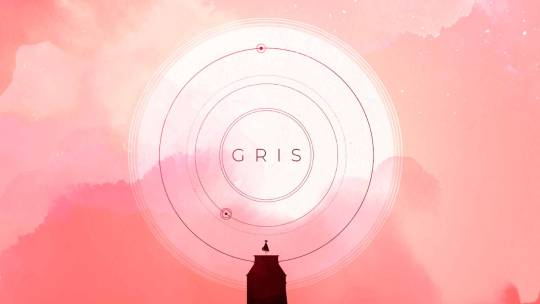
Released only a few weeks ago, Gris is another great example on how a game can exquisitely combine gorgeous artwork with an infinitely beautiful soundtrack, and provide an engaging, and rather creative, gameplay experience. Indeed, I'd go so far as say that is one aspect where Gris actually stands out over Abzû, with puzzles that are quite simple, but may require some lateral thinking from the player at times. The level design is fairly intuitive and I was hardly ever stumped as to what to do or where to go to next. Or maybe I was too busy enjoying the watercolour landscapes to pay much attention to where I was going. While Gris won't take more than 4 to 6 hours of your life, depending on whether you've found all collectibles, it is a visual and auditory spectacle well worth your time.
Runners-up:
Ni no Kuni II: Revenant Kingdom
Forgotton Anne
The PlayStation Exclusives
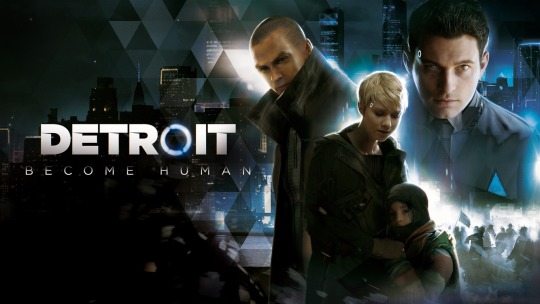
A Telltale-like game on steroids with spectacular visuals, thanks to an insane amount of mocap, and a great soundtrack, Detroit: Become Human really pushed the envelope in regards to choices and consequences within a narrative, so much so that every chapter has a story tree that shows the choices you made as well as the different branching-off points. Our story takes place sometime in the future of Detroit and explores the onset of an android revolution through three different characters, all of them androids: Kara, a housemaid android who runs away with a little girl called Alice; Markus, a domestic android turned rebel leader; and Connor, an advanced prototype specifically designed to help the police track down deviant androids.
Gameplay-wise, Connor’s story is definitely the best of the three, as it allows for more input from the player as Connor has to solve cases with his partner, Lt. Hank Anderson, played by Clancy Brown. These sections of the game are similar to the ones in the Arkham games, requiring you to analyze the scene and put together the clues to recreate past events. At times though, you’ll be placed in adrenaline-filled chases of suspects that make an impressive use of QTEs. As much as I loved this human-android crime-solving duo, the award for most dramatic and emotional story has to go to Kara and Alice’s odyssey to find a new home in the midst of all the chaos. I couldn’t help but feel immediately protective of Alice so I naturally roleplayed Kara as a mom, trying to set a good example for her through my actions. My one regret about this story concerns a decision the developers made, that takes place towards the game’s end and chips away a little at the significance of their relationship for no real value. As for Markus, he felt the more underdeveloped of the three, perhaps because he’s written more as a symbol than a person, becoming the Messiah for all androids (the game’s anything but subtle about this). He’s given a romance arc with the gorgeous Minka Kelly that, sadly, feels unearned, as her character, North, doesn’t have that many intimate moments with him.
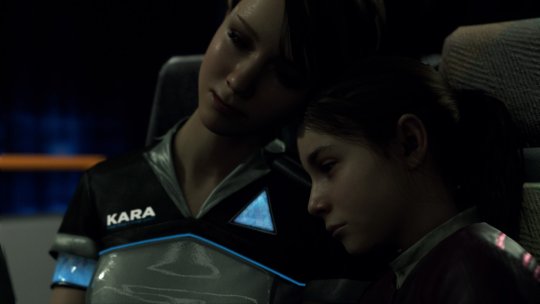
Damn you for so obviously pulling at my heartstrings you two!
No story is without flaws and Detroit: Become Human is no exception. While it does feature humans interacting with androids here and there, I was surprised that the android revolution was 100% human-free, what seems rather disingenuous. The game also does little to explain android deviancy and actually muddles the issue by giving its Messiah a unique ability that ends up being not so unique after all. Furthermore, the story doesn’t explore at all the possibility that, even after going deviant, some androids would prefer to stay with their families rather than join Markus’ uncertain revolution. The game’s not particularly subtle in its depiction of android segregation in human society, to the point some of it struck me as more than a bit ridiculous (exclusive stairs for androids?), but I rolled with it thanks to the strength of some of its characters.
Clocking in at around 12 hours, give or take, this is one game that encourages multiple playthroughs as you read the decision trees to figure out where exactly you want to take the characters next and how to do that. A blind first playthrough is encouraged, especially if you want to end up an emotional wreck. For my part, Detroit: Become Human scratched my sci-fi and Telltale itch this year, and that’s why it makes it on my list.
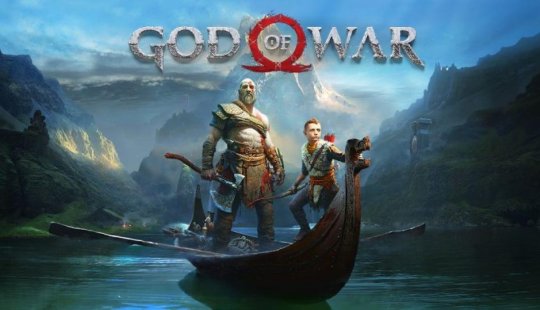
A solid action-adventure title, and one that further disproves EA’s bold, but dumb, claim that single player games are dead. While perhaps not as visually striking as titles like Horizon Zero Dawn or Assassin’s Creed Odyssey -probably due to do the muted colour palette used to depict this world-, God of War remains engaging gameplay-wise, throwing in a healthy mix of satisfying combat and puzzles that will put Kratos’ skills to the test, as well as interesting side quests that never feel like a chore to play, thanks to how well integrated they are to the game’s theme and main story. The customization system is simple enough to understand and use, what is always welcome, and plays a key role in ensuring you will survive your journey, allowing you to upgrade your weapons, craft unique armours, and further tune the both with enchantments, through the tireless efforts of the best side characters in the game, the dwarves Brok and Sindri. The only fault I can find here is related to progression, and how the better armours in the game are available a little too close to the end. By that time, I had three great sets of armour to choose from when I could’ve used at least one of these earlier.
For those new to the franchise, as yours truly, you play Kratos, voiced by none other than Christopher Judge (Teal’c!), a Greek God (with a capital G) who has decided to exile himself to somewhere around Scandinavia after the events of the previous games. The game’s premise centers around trying to fulfill your deceased wife’s last wish to spread her ashes from the highest peak of the mountain. Along for the journey comes your BOY, Atreus, who does his best to connect with a father he rarely knew growing up, what strikes me as odd. Being a Spartan, and given his background, Kratos is more tight-lipped than I would’ve preferred, what makes communicating with his son rather difficult, at least in the beginning. While I understand and welcome what they tried to do with the characters here, I feel the father-son relationship could’ve used further development, especially in regards to a radical personality shift Atreus experiences out of the blue mid-way through the game and is gone just as quickly.
Infused as it is in Norse mythology, comparisons with 2017′s Hellblade: Senua’s Sacrifice seem inevitable, but whereas that game retells the myths via a great narrator, in God of War you actually get to partake in this mythical world and explore some of them. Perhaps precisely because I had previously played Hellblade, most of the twists didn’t come as a surprise, but that doesn’t make them or the story any worse for it. I also have to give the game credit for its ending, which avoided some of the more cliché options available to it. Given the running theme, it would’ve been easy to turn it into something else entirely, and a few minutes leading up to it, I feared that’s exactly what the game would do, but was pleasantly surprised to find out otherwise. It even went the extra mile of hiding away the post-credits scene where one could expect to find it.
In the end, despite a few flaws in its storytelling, God of War is a solid entry in the single player action-adventure genre that I can easily recommend to anyone. If Hellblade didn’t scratch your Norse mythology itch, then God of War most assuredly will.
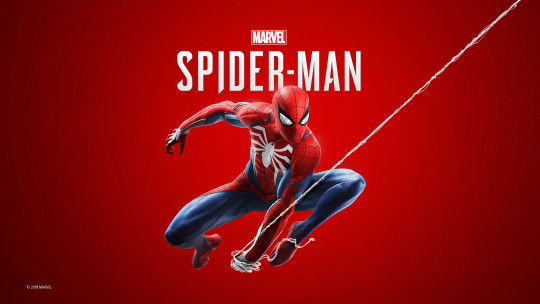
I don’t think it’s a stretch to say this game has done for Spider-Man what the Arkham series did for Batman. Marvel’s Spider-Man is a great Spider-Man story and a very entertaining superhero game, that truly makes you feel like the highly acrobatic, web-slinging, joke-cracking, crime fighter. Swinging your way through NYC was a great rush, reminding me of Mirror’s Edge: Catalyst’s best parkour moments. But Spider-Man is only half of what makes the character great, and the other half, Peter Parker, is perhaps the best adaptation of the character I’ve seen to date, foregoing the tale of his early days as a superhero and reporter for The Daily Bugle, instead focusing on his career as a research assistant under Doctor Otto Octavius. He’s still broke as fuck though.
The story throws you right into the action at the onset, as you ensure Wilson Fisk finally goes to jail for the many crimes he has committed. It doesn’t take long before a new criminal group moves into town however, one that is far less concerned about civilian casualties and is determined to bring down the mayor of NYC, Norman Osborn. So begins a rather complicated web of lies and secrets that both Peter and Spider-Man will have to untangle as the city is slowly engulfed in chaos. Joining you in this fight are NYPD captain Yuriko Watanabe, Mary Jane Watson, now a reporter at The Daily Bugle, and even Miles Morales. Of the three, I liked Yuri the best and felt we could’ve used more time bonding with her. I know very little of Miles’ run as Spider-Man and, while I welcomed his addition to the game, it felt a little lazy to make him such a carbon-copy of Peter. As for MJ, she thoroughly annoyed me with her shtick of getting mad at Spider-Man for constantly saving her, moreso considering how she recklessly puts herself in extremely dangerous situations to begin with.
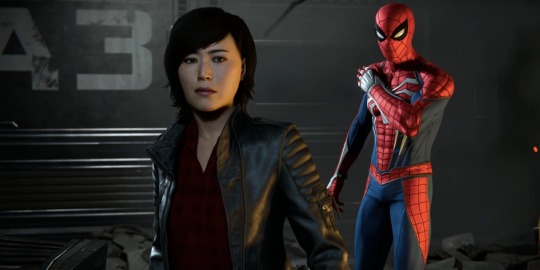
Less MJ and more Yuri please.
The game features an open world that gets layered with side activities the more you progress through the main campaign. It’s a good idea so as not to overwhelm players with a ton of busy work right at the beginning, and I’ll admit some of them give the player more insight into Peter’s past and Harry Osborn’s character. However, busy work they remain, and you’re obliged to tackle at least some of them if you want to buy suits or upgrade your equipment. While often creative, especially Harry’s research stations, their abundance highlight the lack of more (and more interesting) side quests (the amount of loading screens doesn’t help either). Furthermore, teases like Felicia’s Black Cat returning to NYC or even Silver Sable’s introduction were begging for side quests of their own. Even so, the game’s worst sin by far is how it forces you to play scripted “stealth” sections with Miles and MJ that I kept wishing I could skip. I’m a huge fan of stealth games, but these sections felt extremely forced, perhaps done out of a need to give these characters some agency.
In the end though, Marvel’s Spider-Man is one of the best superhero games to date, and perhaps the best story we never got to see on the big screen, but it naturally benefits from a running time longer than 2 hours. Ironically, it’s similar to the recently released Aquaman, in the sense that it throws a lot of familiar faces and action-packed set pieces at you, particularly towards its emotional third act, unfortunately sacrificing some villains (in terms of storytelling) in the process. Furthermore, this final act feels a little rushed, as if it were missing a cutscene or two in the beginning, and likewise in the end to explain the state of the world. Yet for me, Marvel’s Spider-Man’s crowning achievement remains making me feel like one of my favourite Marvel superheroes as I parkour, fight, and web-sling my way through New York City.
Best Soundtrack
This was not an easy choice to make as there were several titles with solid scores this year, such as Detroit: Become Human, created by three different composers for each of the characters, Peter Due’s Forgotton Anne, or even Joe Haisashi’s Ni no Kuni 2: Revenant Kingdom. Even John Paesano makes a comeback from his average work on Mass Effect: Andromeda with an excellent main theme for Spider-Man as well as a few other great tracks like “City of Hope” (which plays every time you traverse the city), “Responsibility” and “Behind the Mask.” But the difficulty in choosing one of these increased exponentially when Gris released to an absolutely mesmerizing score by Berlinist, putting me in a similar predicament as last year. In the end though, only one gets to take home this prestigious award, and that game is...
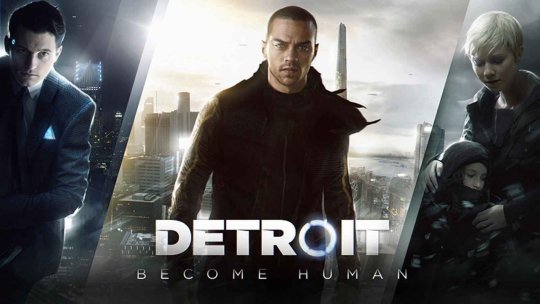
This one was almost a toss between Gris and Detroit, but, in the end, I have to give it to the latter for the sheer amount of work put by Philip Sheppard (Kara), Nima Fakhrara (Connor), and John Paesano (Markus) into crafting three separate and distinct scores that not only feel authentic to each of the characters but are also wonderful to listen to on their own, effectively elevating the source material, something not many titles can boast. If you were to force my hand right now to pick between one of the three, I’d naturally have to go with Philip Sheppard’s score, as his Kara leitmotif was the one that stuck with me the most throughout the game. It’s a simple string composition but the things he does with it, the way he builds upon it, it’s something truly wonderful. It doesn’t hurt that I loved Kara and Alice’s story the most, from an emotional standpoint, and Philip Sheppard’s score plays no small part in this. Having said that, I also have to congratulate Fakhrara’s Connor score, far and wide the one that feels more at home in this sci-fi world, and Paesano’s work in elevating Markus’ character through his music, with great tracks such as “Something You’ve Never Seen Before” or “Markus’ Speech,” to mention a couple. Like last year’s NieR:Automata, Detroit: Become Human’s score is definitely worth a purchase.
Runners-up:
Gris
Forgotton Anne
The Animated Adventures
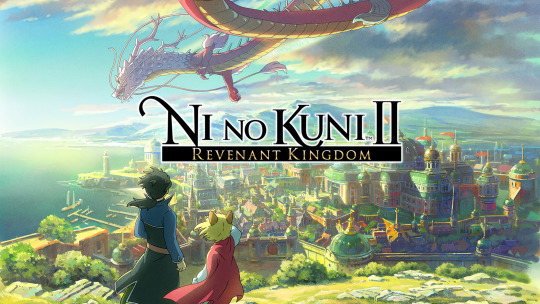
Of all the games in this list, none fit the category of “family game” better than Ni no Kuni II: Revenant Kingdom. Everything from its bright and colourful art design that could be lifted straight from a Studio Ghibli production at times, imaginative world and characters, and cheerful soundtrack, made this game a delight to play from beginning to end. It was truly refreshing to play such a straightforward and sincere story about a young prince who wishes to unite the world in peace, working together with his mentor and a motley cast of allies from all corners of the world. The story is framed as a series of chapters, with opening slides and even a narrator to close each one, and it follows Prince Evan as he's exiled from his kingdom after a coup, yet finds the strength in his newfound commitment to bring peace unto the entire world. As such, he founds a new kingdom that you get to micromanage throughout the game, building and creating different facilities, undertaking research or crafting new weapons and armour, finding new recipes for your cook, or scouring the world for people keen on becoming the first citizens of your new kingdom. Unless you’re planning on rushing through the main story, kingdom building will take a good deal of your time, as you’re sent on quest after quest to gather ingredients, find missing people, or engage in battle from time to time. To give an example, it took me 37 hours to beat this game and I still had a ton of things to do on my quest log!
As perhaps one would expect from such a kid-friendly game, Ni no Kuni II is surprisingly easy to play, so much so that people actually complained it lacked difficulty levels, which were eventually added in a patch. If I had to criticize it for something, it would have to be for its world map exploration, which looks similar to Worlds of Final Fantasy, a design decision that clashes with the vibrant Ghibli-like art that is prominent throughout. Perhaps it was outsourced to a different studio than Level-5? Also, the amount of side content in this game can get a bit overwhelming and more than a little repetitive, but if my runtime proves anything, it’s that you can engage it at your own leisure (indeed, it takes 90 hours for a completionist run), or not. The game also features a sort of in-world Facebook/Twitter where you can check posts with pictures of events that have transpired, people looking for new jobs or challenges (a nice way to search for citizens), or even examples of the world’s flora and fauna. It’s a nice little feature that makes the world feel a little more alive and reactive than it really is. As for its score, composed by Joe Hisaishi, while it does have great tracks such as “The Curious Boy” (my personal favourite), “Kingmaker’s Theme,” or “Happily Ever After,” not to mention its main theme, and is solid overall (more so than other titles in this list), it’s probably not one I’ll often find myself listening to, which is why I didn’t award it with my Best Soundtrack award.
All in all, Ni no Kuni II: Revenant Kingdom is a title I’d heartily recommend to anyone who wants to experience a charming and colourful bedtime story in a little country a long, long way from here...
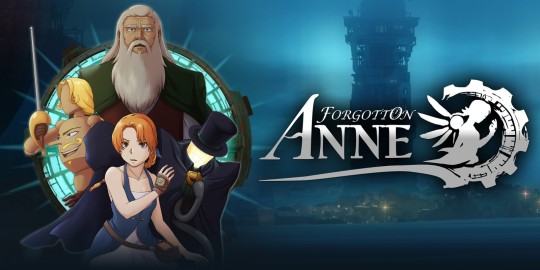
Developed by ThroughLine Studios and released by Square Enix earlier in May, this game wasn’t even on my radar, but, like Ni no Kuni II, Forgotton Anne is a game brimming with imagination, that pleasantly surprised me with its great voice acting and soundtrack. Unlike Ni no Kuni II however, the game maintains its beautiful, hand-crafted, aesthetic throughout, making you the protagonist of an animated adventure with high production values, as you take on the role of Anne, a human tasked with enforcing the law in a world of forgotten objects turned sentient, called Forgotlings. When a group of rebel Forgotlings strike a power plant, Anne will have to track down the mysterious rebel leader and uncover the truth about herself and this world. Forgotton Anne is a game that allows you to roleplay a ruthless Enforcer as well as one that prefers more peaceful means of resolving conflict and these decisions are acknowledged throughout the game. Equipped with the Arca, a glove that allows you to manipulate anima (or soul energy), Anne will often be presented the choice of 'distilling' Forgotlings or sparing them, opening or closing certain doors for you.
The game plays as a platformer with puzzles that revolve around your use of the Arca to open doors, power up consoles, etc. These are not terribly difficult but you may find one or two that leave you scratching your head for a bit. Exploration is encouraged by way of collectibles and, in fact, a feature is introduced at the end of the game that allows you to travel back in time and replay certain levels in order to track down memorabilia and unlock achievements. It's a neat way of allowing replayability while in the context of the story and it gets extra marks from me for the additional effort.
While the story is largely predictable, it's by no means any less good for it and was, to my mind, perfectly executed. One lingering issue I have, nonetheless, is how the game makes a reveal halfway through, believing it'll have more impact than it actually did as I'd already been playing under the basis this was true. Perhaps they should've made more of an effort to hide it in the beginning. Then again, maybe that would've drawn more attention to it. Another issue I had storywise has to do with how underdeveloped, and slightly contradictory, I felt one of the endings was. It's a feeling I also had when playing the original Life is Strange and realizing how much more effort was put into of the endings as opposed to the other.
When all is said and done, Forgotton Anne is a charming animated adventure that will undoubtedly pull at your heart strings, but also make you smile merely for being allowed to partake in this world of ill-tempered teddy bears, trigger-happy guns, and Shakespearean mannequins, and it’s a definite recommendation.
Lara’s Final Chapter
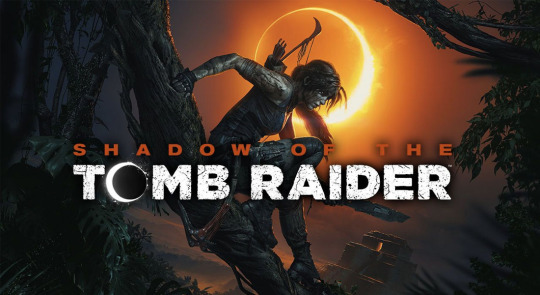
Shadow of the Tomb Raider delivered almost everything I wanted from a new entry in the Tomb Raider series, but not all I would’ve expected from Lara’s final chapter. Together with her friend Jonah, Lara must stop Trinity from finding an ancient artifact in South America that has the power to reshape the world. However, in her rush to beat Trinity to the finish line, Lara may have inadvertedly set in motion a series of events that threaten to trigger an apocalypse. As a result, Shadow of the Tomb Raider turns out to be a darker game than its predecessors, a fact highlighted at several points throughout the game, but never sufficiently explored, though I give it credit for acknowledging it. Sadly, while Shadow tries to tie together the Trinity storyline from Rise, we learn very little in terms of the composition and overall goals of this shadowy organization, that is now practically reduced to providing cannon fodder for our favourite Croft. The main villain is a little more nuanced and sympathetic than previous ones, and for once the series doesn’t tie your hands behind your back during the final boss fight. Unfortunately for the game, I was more invested in fighting his lieutenant, who gets killed in a cutscene.
In terms of gameplay, Shadow doubles down on tomb raiding, adding underground and underwater exploration, but one can’t help but feel its maps are more constrained than in Rise, favouring the Uncharted series’ more linear approach, particularly when it comes to the game’s combat sections, which feel more scripted than ever before. Perhaps by way of compensation, the game introduces a new stealth mechanic that allows Lara to camouflage herself, thus getting insanely close to her enemies, and the ability to hang enemies from tree tops a la Arkham series. The crafting system now allows you to harvest insects to craft poison grenades or special arrows that turn your enemies against each other, though, regrettably, these are introduced rather late in the game. Weapon customization also makes a comeback as does Lara's ever-increasing wardrobe. Shadow also tries something new by introducing side quests, but thankfully never so many as to feel burdensome.
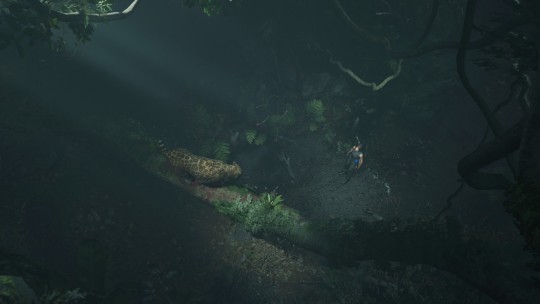
This game looks pretty to boot too.
The music is mostly unremarkable, working to great effect immersing you in the setting and building on the game’s atmosphere, as I’m sure was Brian D’Oliveira’s intention, but there's nothing that'll stick with you after you're done tomb raiding your way to the end. The pieces that stood out to me the most are “Lara's Dream” and the end credits song, “Goodbye Paititi,” but that’s about it. This might partially explain why Lara’s final chapter lacks emotional resonance; a lot of the emphasis is placed on the action, few, if any, leitmotifs or themes are introduced, with (maybe) only the main theme carried over from previous games. It would be wrong to lay the blame entirely at Shadow’s feet when the first game didn’t establish a musical narrative beyond Lara’s theme though. I don't recall a Jonah theme or a Trinity theme, for instance. Perhaps if the series had maintained a coherent musical narrative with its score the story beats would've been more impactful.
Our story ends in an uneventful note that I feel doesn’t do the series justice. It’s not a bad ending, but it doesn’t pack the same punch as, say, Uncharted 4 did. In a way, this is a curse of its own making, as the Tomb Raider series is tonally different from Uncharted; and whereas the strength of the latter rests in Nate’s interactions with his friends and family, Lara has always been terribly isolated in these games, Jonah notwithstanding. Thus, while not exactly the swan song our tomb raider deserves, if you played the previous two games, Shadow of the Tomb Raider is definitely not one to miss.
Best Side Content
I don’t think any other game I’ve played this year has come close to making its world come alive nearly as much as this game did. With plenty of side quests and side activities, it would be easy to make them seem like busy work, but this game somehow manages to turn them into events the player can look forward to, building the world these characters live in, making it feel real. Some are so entertaining that I found myself delaying the main campaign so I could play more of them. No game released this year did this better than...
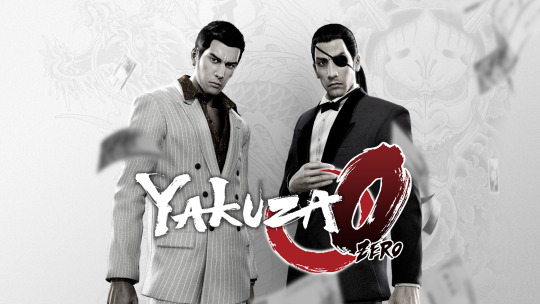
While the game shows some signs of its age (it was originally released in 2015 in Japan), what it lacks in visuals it more than makes up packing its world full of fun things to do. Do you want to go out for drinks and do some karaoke? You can do that. How about some batting practice? You can do that too. Dinner? Sure. Car racing? You bet. Can I rock the dance floor? Like freaking Travolta. You can even play games at your nearest SEGA arcade, bet big on an underground fight ring (there are two), get into real estate or manage your cabaret club, by far the mini-game I had most fun with. The amount of detail put into some of these mini-games is beyond ridiculous and would definitely justify having a game of their own. Beyond these activities, you also get to meet a lot of interesting NPCs that have their own unique stories to tell and that you always feel glad to have helped at the end of the day. You can help a mother rescue her daughter from a cult, have the Chinese mafia fake a ring for a guy’s girlfriend, teach a dominatrix how to be better at her job, or even share your stories with a radio programme to win a prize, to mention a bare few. You can also have a few laughs at how bad Majima is tailing people and trying to hide from them.
Yakuza 0 is an example of side content done right, that foregoes the modern-day open-world formula, opting for a more constrained setting a la Deus Ex: Human Revolution, but that feels big and rich thanks to its content and characters. And on that note, let’s give it up for Judgement Kazzy!
Runners-up:
God of War
Ni no Kuni II: Revenant Kingdom
youtube
Assassins No More
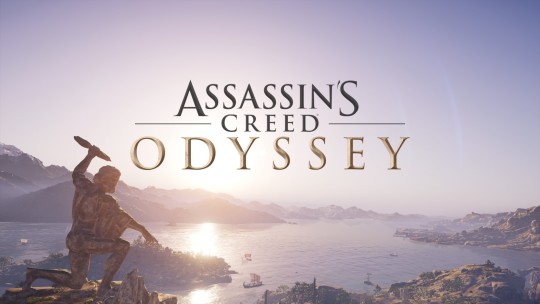
Last year, Origins made it into my list through sheer spectacle, the lure of exploring Ancient Egypt, and the promise of a return to the modern storyline of the Isu with the introduction of a new set protagonist, Layla Hassan. This year, Odyssey ups the ante by delivering a story that, while still revolving around a family drama, no longer makes revenge the driving force of the narrative. Indeed, for a good chunk of the game, our character’s motivation (Kassandra, in my case) is a blend of making a living as a mercenary and exploring the world beyond her small island of Kephallonia. Given how beautiful and colourful the world in Odyssey is, I’d say it was a smart choice. The game also introduces more interesting side quests than its predecessor did, and better tied to the main campaign, with one of my favourites being the Silver Islands arc; perhaps in no small part thanks to how cute the rebel leader, Kyra, is. In fact, Kassandra can romance a TON of people as she explores the world and runs errands, but, sadly, no relationship is as well crafted as, say, your relationship with Triss or Yennefer in The Witcher 3. Some might come close to being as impactful, such as your relationship with Daphnae, one of the Daughters of Artemis, but they’re all mostly just one-night stands, with one particular relationship coming out of the blue as the game ends that I wished the game had set up and built further.
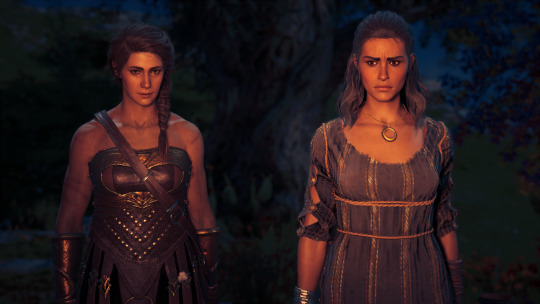
I know I said cute, but hot works too.
Gameplay-wise, Odyssey plays very much like Origins, with a more streamlined crafing system, that requires less variety (but still tons) of resources to upgrade your gear, but with blocking gone after the shield was removed, an odd design choice. You still get to level up your character, though the leveling-up curve is rather steep at the beginning, forcing you to play much of the side content that would qualify under busy work. It doesn’t help that the in-game store sells a Permanent XP booster that gives you an additional 50% XP for $10, as well as materiales to upgrade your gear, and has the balls to outright call them “Time Savers.” Ubisoft further pushes the in-game store and Helix credits by introducing a new currency in-game, necessary to buy crates with random legendary gear drops from a special vendor, that you get at a much slower rate than your usual credits. I’m not too mad about this, given that the game does reward you with some great-looking armours through normal playthrough, but it’s something we should be on the lookout for future titles.
Naval battles make a return and, simple as they are, I welcomed the distraction and opportunity to sail the Aegean Sea and discover new locations and secrets. At times, Odyssey manages to replicate the sense of wonder and mystery I experienced when playing Skyrim. On the other hand, Conquest battles, its newest addition to the franchise, fail to live up to the expectation. Beyond their limited scope, the worst sin they commit is how inconsequential they are, having no impact in the world around you beyond what banner the closest fort will fly. Curiously, these battles are missing from the main story's end content, what seems odd considering they would've been a perfect fit for the story. In fact, there's a stark contrast between Chapters 1-7 and 8-10, with the latter chapters moving at a brisk pace that is not necessarily justified. On the plus side, Ubisoft has seemingly embraced the Isu civilization, what has allowed them to include mythical creatures like the Minotaur or Medusa, and even throw in Atlantis for good measure. I only hope they’ll go the extra mile and throw in some Greek Gods as well.
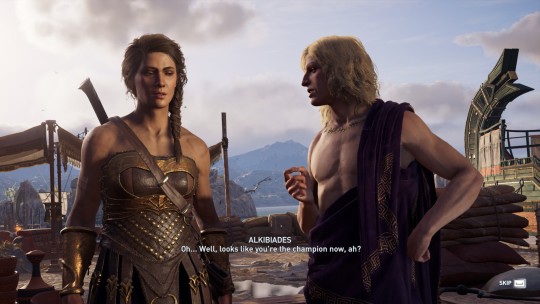
The game has some well-placed humour as well.
For all the things it does better than Origins however, I feel Odyssey takes a few steps back, especially insofar the modern-day storyline is concerned. While Layla Hassan makes a comeback, her story is so short and uneventful that it comes across as an afterthought, jumping ahead in time and introducing a whole host of new characters we have never met and referencing events we know nothing about. Layla herself experiences a radical transformation from being skeptical of the assassins’ intentions to becoming one of their strongest supporters. Nothing about the modern-day storyline makes a lot of sense, with many gaps that are probably filled in with other material such as comics and novels, but I’ve always believed that to be the hallmark of lazy and poor storytelling. Either commit to the modern-day storyline or don’t, Ubisoft, you can’t have it both ways.
Overall, I feel like Odyssey is an improvement over Origins, and that’s why it makes it on the list. I am however, skeptical that Ubisoft will pull it off a third time before the charm and novelty of an open-world Assassin’s Creed game wears off -it already is thanks in no small part to its side content-, or before they push the Helix Store so hard down our throats that they have their own Battlefront 2 controversy. Perhaps they still have a shot with a game set in Japan or China. Only time will tell.
My favourite game of 2018
This wasn’t a particularly easy choice to make considering the different strengths and weaknesses of the games in this list, not to mention their different approaches to storytelling. Assassin’s Creed: Odyssey is a strong contender, but its world is so filled with busy work, its modern-day story so underdeveloped, and the push of the Helix Store so blatant, that I cannot in good conscience say this was my favourite game of 2018, let alone GOTY. Likewise, Shadow of the Tomb Raider was initially well-positioned in my mind to take it home, but it just didn’t stick the landing for what it’s supposed to be (but hopefully isn’t) Lara’s final chapter. Another single-player action-adventure title, God of War, gets almost everything right, but I couldn’t connect with the story of Kratos and Atreus in the same way I did, say, Kara and Alice in Detroit: Become Human. I could go on knocking out competitors, but I’d rather talk about my favourite game released in 2018...
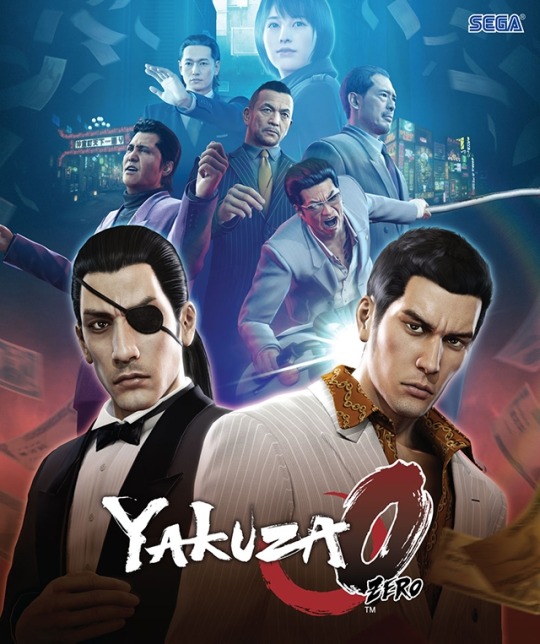
Yakuza 0 is not a perfect game, but it gets pretty close at times. Set in the 80s, Yakuza 0 follows the characters of Kazuma Kiryu and Goro Majima, two rookie Yakuza who, for different reasons, have fallen in disfavour with their respective families, and need to figure out whether they have what it takes to return to the fold. That’s about as much as I can reveal without talking spoilers. No story in any of the games I played this year gripped me nearly as much as this one did (some moments in Detroit: Become Human come close), not only because of how well-written the characters are across the board (including the villains who come across as fearsome opponents), but also because of its many twists and turns that will keep you guessing what the real goal of the different players you find yourself involved with is. Your character, be it Kiryu or Majima, and his understanding of events by the game’s end, is radically different from his starting point, as you unveil plots within plots within plots, a result of the many and varied agendas at play here. To say this game has as many layers as an onion would be high praise... for the onion. Both Kiryu and Majima are powerful characters in their own right when fighting thugs, as demonstrable by the gameplay, but Yakuza 0 is quite ruthless in showing you exactly how out of their depth they are when they decide to take on... bigger opponents. You would think this is because Kiryu and Majima get beat up, and they do, a lot, but I actually found it’s the conversations they have with other characters, the villains in particular, that’s the highlight of the game. Yes, characters in Yakuza 0 talk, a lot, so you’d better get used to it, but these conversations, excellently voice-acted, fill the atmosphere with so much tension, dread, or sometimes anticipation, that you can’t help but be absorbed by them, as you can never guess what the other party might say that will surprise you. And this game surprised me a lot.
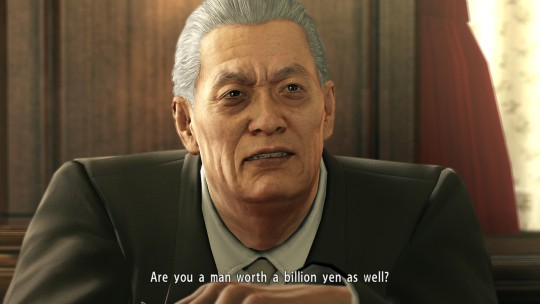
Man, the conversations in this game...
Having said that, it is true many of the twists and turns that were a surprise in the beginning started to feel a bit trite when they’re re-used in the final chapters. One that annoyed me in particular was the game’s use of the “Your Princess is in Another Castle” trope (incidentally, God of War also does this to some extent), sometimes forcing events a little much to pull it off. I suppose this has to do with the fact that this “Princess” becomes the sole motivation for your two characters towards the end, getting shuffled around so both Kiryu and Majima can get a crack at the villains. It works thanks to the strength of the characters and their dialogue, but I would certainly take issue with a lesser game that kept me running around the place for 4 or 5 chapters straight. I also felt that, of the two leads, Kiryu’s ending is the one that feels more natural to his character, as opposed to Majima’s, who experiences an odd personality shift that doesn’t seem to jibe with what we know of him. It’s possible this has to do with the fact that, while Yakuza 0 is the starting point in the series for our two protagonists, it’s not the first game in the series. As a matter of fact, there were 5 Yakuza games, released over the space of 10 years, prior to Yakuza 0.
Having previously awarded it with my “Best Side Content” award and praising it for its world-building, despite not being an open-world game (yes, you can have invisible walls and still make a great game!), Yakuza 0 only needed to deliver on its story and characters, and it did that in spades.
And that’s it for my list of the best games I played in 2018! It’s a bit of a long read, for sure, but I could hardly have done these games justice had I written less, and in some cases I probably didn’t write enough. What about you? What are some of the best games you played in 2018?
#best games of 2018#gaming#gris#detroit become human#god of war#spider-man#ni no kuni 2#forgotton anne#lara croft#shadow of the tomb raider#assassin's creed#assassin's creed odyssey#yakuza#yakuza 0
0 notes